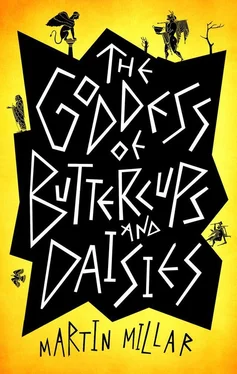Decline had set in some years ago. As the war dragged on, and the city suffered, so did the tavern. For the first few years, citizens had maintained their optimism. People might grumble as they were called up into the army, but they put on their hoplite armour, picked up their shields, and went away to serve loyally, believing in the promises of the politicians and orators. For a while, these promises came true. Athens already ruled a large maritime empire and at first it seemed they were going to get the better of the Spartans. Then came the reverses. The war started to go badly. The Spartans marched over from the Peloponnese and began destroying Athenian lands. Athenian colonies took the opportunity to revolt and stopped paying taxes. The city’s income began to shrink. The Trident was no longer such a happy place.
Each year the situation had become worse. After ten years of fighting, Polykarpos was fortunate to serve a few customers a day. Those who did arrive barely had the money for a small cup of wine. Even if they had, the Trident often had little to sell them. Like everything else, wine was in short supply. Athenian vineyards had been destroyed, and there was precious little coming in through the port at Piraeus.
The elderly citizen Methodios appeared through the front door. Polykarpos hadn’t seen him for a while, though he used to be a regular. He mended fishing nets down at the harbour. He took out a small silver coin and asked for a jug of wine.
‘Business picking up?’
Methodios scowled. ‘What business? I’ve got no workers left. Every young man in Piraeus is rowing a warship. Even the slaves were freed so they could be recruited. There’s no one left to mend fishing nets. The only reason I’ve got a coin to my name is because I was called up for jury duty.’
A young prostitute, momentarily hopeful at the appearance of a customer, looked away, disappointed.
Methodios sighed as he sipped his wine. ‘I fought the Persians. Desperate times, but they weren’t as bad as this. How long can it go on for?’
The landlord didn’t reply. Athenians had been asking that for years, and no one had an answer.
‘Some Spring Festival this is going to be,’ muttered the old net-mender.
‘Maybe something will come of the peace conference.’
‘Not likely, from what I hear.’
Polykarpos had noticed a change in attitude among his customers recently. All of them had been involved in the war in some way or another. A few years ago, there had been no talk of peace. That might have been seen as bowing down to the Spartans, which they would never do. Now, people weren’t so sure. Even when news came in of the powerful Athenian navy destroying Spartan settlements, it wasn’t greeted with the same enthusiasm it once had been. The Spartans, after all, were busy destroying theirs.
‘It might help if our own politicians could agree among themselves,’ said Polykarpos.
Methodios snorted as he sipped his wine. ‘Damned politicians. Only interested in lining their own pockets. I hate them.’
Luxos rose, poked his head out the window, and smiled.
‘It’s a beautiful morning. Good day for writing poetry.’
He busied himself with breakfast, which didn’t take long as the only food available in his tiny dwelling was a small scrap of stale bread, hardly enough for a child’s snack. Luxos, however, was used to going without food. In the poor part of the city, many people were hungry these days. Luxos’s poverty was more extreme than most, but he had an optimistic nature and was sure something would turn up. He was nineteen, orphaned, and apparently without prospects, but he had belief in his own abilities, and a great faith in the Goddess Athena.
He addressed his stale piece of bread, quoting a few lines from Archilochus:
If he keeps complaining of woeful misfortunes,
No citizen will take pleasure in feasting,
It’s true my noble soul has suffered in the roaring sea
And my heart has been broken
But to woes incurable,
The gods have ordained the remedy of staunch endurance.
So banish your grief,
Endure, and prosper.
Luxos washed down the stale bread with his last remaining mouthful of cheap wine.
I can really feel things turning my way. I’m sure Athena is going to help me any day now.
He put on his worn sandals and his ragged chiton and set off into the sunshine to see what he could find.
General Lamachus met with General Acanthus far outside the city walls, away from prying eyes. With the Spartan delegation already in Athens for the peace conference, it wasn’t so strange for an Athenian general to be talking with a Spartan, but their business was private. Acanthus sat erect on his horse, his red cloak and long hair easily identifying him as a Spartan. Lamachus’s cloak was blue and his hair was short, but the Athenian cavalryman didn’t feel they were really so different.
‘What’s the mood among the Spartan delegation?’
‘Still undecided. But I suspect they’re leaning towards voting for peace, and signing the treaty. What about Athens?’
‘The same.’
There was a pause. They looked back towards the walls. The spring sun was overhead, already hot.
‘I don’t want that to happen,’ said the Spartan general.
‘Nor do I.’
‘It won’t take too much for me to persuade the Spartans not to sign.’ Acanthus looked pointedly at Lamachus.
‘I don’t control the Athenian delegation,’ Lamachus told him. ‘There has to be a vote in the assembly. A lot of people want peace.’
The Spartan sneered. ‘Athens pays too much attention to the people.’
‘I know. But there are ways of influencing them.’
Aristophanes could still remember the pride he’d felt when he first walked up the Pnyx to take his seat with the rest of the citizens in the Athenian assembly. He was eighteen, and old enough to vote on public matters. It was a proud moment. A decade or so later, his enthusiasm had dimmed. Allowing every adult male citizen to discuss and vote on every decision was excellent in theory, but it hadn’t rescued them from ten years of war.
Even though his plays had made him a well-known figure in Athens, Aristophanes wouldn’t have claimed to have much influence in the assembly. You needed a very loud voice to sway the crowd.
A loud voice, and a lack of scruples, thought the playwright sourly, as he watched Hyperbolus haranguing the assembly. Hyperbolus, a lamp-maker by trade, was the extreme democrats’ new hero. Aristophanes loathed him.
‘Nicias and his peace-loving friends are traitors!’ roared Hyperbolus, shaking his fist. ‘Anyone wanting to make peace with the Spartans is a coward! The rich people of Athens would rather cosy up with the Spartans than give the poor people of Athens their fair share of the wealth.’
Many citizens shouted their approval. Nicias, elderly now, sat with a dignified look on his face.
As Hyperbolus carried on, Aristophanes nudged Hermogenes, who sat beside him in the open-air assembly.
‘Is this oaf ever going to stop speaking? We’ve got work to do.’
‘I don’t see us getting to rehearsals any time soon,’ whispered Hermogenes. ‘Nicias is going to make a reply.’
Aristophanes groaned. ‘The dignified but stumbling oratory of Nicias. We’ll be here all day.’
‘He’s not such a bad orator,’ said Hermogenes. ‘Not many laughs, but he makes his point.’
‘Eventually, I suppose.’
Aristophanes yawned. With the sun blazing down, and the effects of last night’s wine still not fully out of his system, he was finding the assembly more than usually irksome.
Читать дальше












